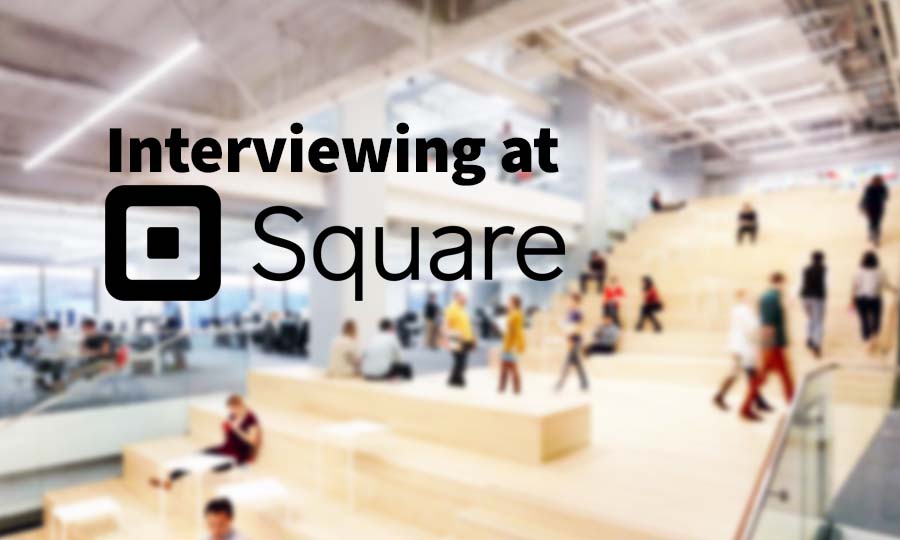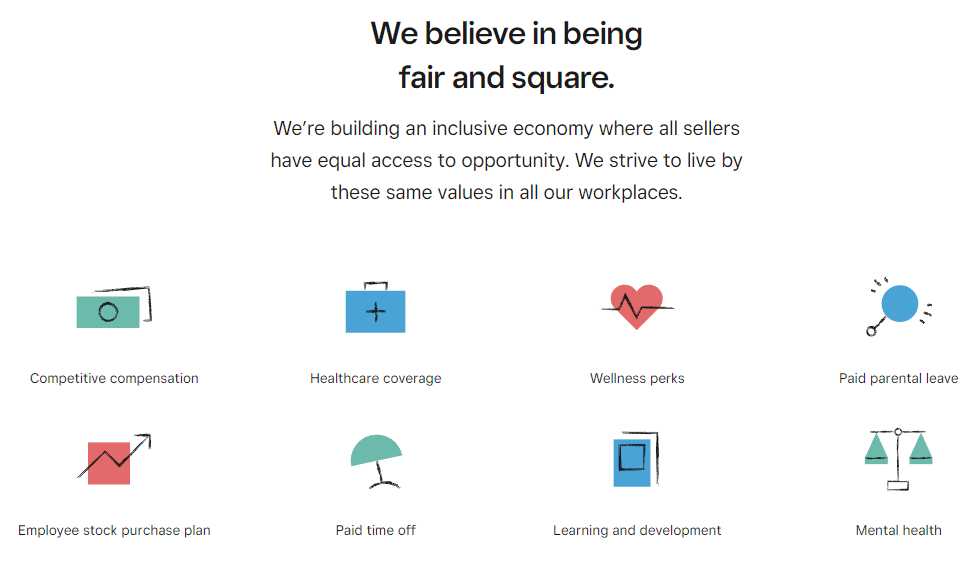15 Acing Vital Square Interview Questions (2023)
Getting a job at Square is no mean feat. If you prepare for your interview, however, you'll stand a better chance. Here's are some common questions you could be asked and how to answer them.

Having an interview at Square is quite an achievement for any engineer, so consider yourself lucky if you’ve been selected for an interview. If you don’t know what to expect or how to prepare for the process, don’t worry! Today, we will tell you all about the company, its hiring process, and every crucial detail you can expect. Most importantly, we’ll explain how to prepare for it and ace your interview like a pro!
What Is Square?
Square is a billion-dollar tech startup and one of the most famous digital payment service companies in the U.S. The company employs over 5,000 people and is ranked as one of the best tech companies in the world. Working at Square, you will enjoy a culturally diverse environment that values integrity and inclusion.

Some of the benefits Square has to offer
What Does the Square Interview Process Look Like?
The Square interview process is designed to prove to your future employers that you've got the programming skills needed to fulfill the role of an engineer. The process itself is pretty straightforward and consists of several coding rounds, distributed system rounds, and some behavioral rounds. Generally, it's made up of three parts, including:
- The Initial Screen
- The Technical Screen
- The On-Site Interview
1. The Initial Screen
During the first part of the Square interview process, you'll have to answer a couple of basic questions about yourself, your past experience and organizations you've been a part of, your skill sets, and similar details. This is after the recruiters get in touch with you after you've applied to an engineering position through LinkedIn or other platforms. In case your CV and profile align with the requirements needed to be met for the position, you'll be invited for a technical interview that takes place over the phone.
Would you like a 4 day work week?
2. The Technical Screen
This part of the Square interview process is designed to test your programming and problem-solving skills. Square is all about delivering services at scale, and its engineers need to be able to come up with solutions for the seamless delivery of its services. That's why the technical screen will test your knowledge of data structures and algorithms through a couple of coding problems.
You will most likely need to write code that optimally executes the required solution. If you meet the problem-solving standards your employees are looking for; you'll be invited for the last stage of the Square interview process.
3. The On-Site Interview
The final stage of the Square interview process consists of several interviews that go over coding, system design, and, lastly, soft-skill and behavioral questions. This stage usually includes:
- Coding round: You need to solve a problem on DSA by writing code, which will display your knowledge of various algorithms.
- Design round: Then, you'll need to answer a few questions about applications and scalable systems. You can expect questions regarding network protocols, security, scaling systems, etc.
- Behavioral round: You need to answer a set of behavioral questions that will cover your past experiences in previous organizations, your personality, and other similar questions that will show your interviewers whether you’re the right person for the job.
Square Interview Questions
Now that you have a rough picture of what the Square interview process looks like, we will tell you all about the questions you can expect during your interview. Although the list might seem daunting at first, don't worry because we're sure you'll ace it if you prepare for them!
Interview Questions for Software Engineers
The first set of questions during your interview tests your knowledge regarding core data structures and algorithms. The answer you give needs to show that you are familiar with the following concepts:
- Sorting algorithms (e.g., quicksort, heap sort, etc.)
- Strings, linked lists, arrays
- Trees and graphs
- Recursion
- Graph algorithms
- Greedy algorithms
- Dynamic programming
- Hash tables and queues
The questions you might be asked to show your familiarity with the mentioned concepts include:
- Transform the given string s containing a set of words in such a way that the words appear in reverse order with one or more spaces between words in s.
- Find two missing numbers in the given unsorted set of numbers from 1 to N.
- Find K largest elements from a given stream of numbers (integers, arr, of size n, analogous, etc.).
- Return the given sequence to its lexicographically greater permutation. If it doesn't exist, return it in ascending order.
- Build a new graph with reverse edges using a given graph. Also, build a new graph with the same number of codes, but every edge is reversed using a strongly connected directed graph.
- Find all magic triples in a given integer array arr of size n. A triplet is a group of three numbers (sum is zero).
- Write a code to generate the mirror image of the tree with the given binary tree 'T.'
- Find the minimum number of coins required to express a given amount of money in a given variety of coins. You should assume an infinite supply of coins.
- With the partially filled two-dimensional integer array, fill the empty cells so that each row and column and 3x3 subgrid has every digit from 1 to 9, but only once.
Tip: If you’re on the search for a software engineering job, 4 Day Week has a directory of engineering positions available right now. Click here to check it out!
Design Interview Questions
During your interview, the employers will want to test your knowledge of core distributed systems (e.g., databases, network protocols, concurrency, API modeling, systems processing, etc.), as Square's service is built on scalable applications and systems. To test your knowledge, the interviewers might ask you:
- Describe the process of designing an automated chatbot?
- How would you build a file-sharing program such as OneDrive?
- What steps would you take to ensure Square’s transactions are secure?
- How would you integrate a system that notifies users when transactions are made?
Behavioral Interview Questions
Other than technical questions, you will also be asked behavioral questions because leadership, ethics, and morality are all important features of a software engineer. The questions you can expect to cover these traits include:
- How do you avoid distractions while you’re working?
- Why do you want to leave your current company and join Square?
- What was the most difficult project you worked on?
- Have you ever missed a deadline in the past, and why?
- Have you ever disagreed with your superior? Give us an example.
- Tell us about the time you had to make crucial decisions for a big project?
- How important are relationships with coworkers for you? Tell us about a time when you couldn’t get along with a coworker and how you resolved the situation.
How To Ace the Square Interview
Here are some more tips on acing your Square interview:
- Start preparing at least a couple of months before the interview, as you will have enough to go over the numerous topics and excel at coding.
- Spend some time preparing the behavioral questions as they can set you apart from other candidates.
- Remember patterns in coding problems you already solved and apply them to new ones.
- Do a mock interview with your friends and colleagues.
- Try to be as confident as possible and remember that it’s human to make mistakes.
- Make a clearly defined plan, stick to it and stay consistent.
- Use the STAR framework to answer Square questions.
How To Use the STAR Framework to Answer Square Questions
If you want to make sure you ace your Square interview, you should implement the STAR (Situation, Task, Action, and Result) framework in your answers. This framework will make you stand out from other candidates as it will enable you to provide unique and thoughtful answers to any behavioral questions your interviewers might ask you. With it, you can give your interviewers a perfect example of how your actions made an impact in your workspace.
But how do you answer behavioral questions using the STAR framework? Let’s take a look at how you would answer the question: ‘Tell me about a time when you faced a challenge, and how did you solve it?’ using the STAR framework.
- Situation: The first step requires you to set the scene and give the key details about your story. So, come up with a story that’s unique, tell an anecdote from work that you were a part of, but make sure that it can showcase your skills and virtues.
Answer: In my previous role as lead engineer, our team was short-staffed due to the COVID-19 pandemic. Our managers were setting stringent deadlines that were unrealistic given the circumstances. Consequently, our team felt overwhelmed and stressed.
- Task: During the second step, you should set the tone but don’t include unimportant details. Instead, focus on the crucial parts and make sure your interviewers have a clear picture of your example.
Answer: Being the lead engineer on this project, it was my responsibility to keep the team motivated and ensure our deadlines were met.
- Action: Now, you need to tell your interviewers about the actions you took to solve the problem in your workspace. Include any actions you think can set you apart from other candidates, and you'll be golden.
Answer: To create transparency across the team, I established a formal project request process and broke down our project into smaller bits with timeline estimates for each process. I also held weekly meetings with our managers to discuss our workflow and provide progress reports, along with realistic timelines for our upcoming tasks.
- Result: Lastly, talk about the outcome of the situation and explain your role in it. Showcase your contribution, but don’t forget to include your team as well.
Answer: By setting clear expectations and providing transparency between our team and managers, we were able to hyperfocus on our weekly tasks without feeling overwhelmed. As a result, we were able to complete all the tasks in our backlog in a timely manner, despite the difficult circumstances. Our managers saw the importance of discussing deadlines with our team and we continued to hold weekly meetings. Consequently, we saw a 15 percent increase in productivity in the next quarter. This proved to be a great lesson on the importance of communication in our department.
Tip: To strengthen your resume and increase your odds of securing an interview with Square, check out our guide on how you can also utilize the STAR framework for building your resume.
Getting Ready for Your Interview at Square
Hopefully, we've helped you prepare for your Square interview and painted a picture of what you can expect. Don't forget to practice and, most importantly, relax and bring your confidence to the interview!
To browse jobs from tech companies such as Square, Amazon, and Facebook, be sure to check out our extensive job board! You can also have a look at our blog to learn more tips to help you land your dream job!